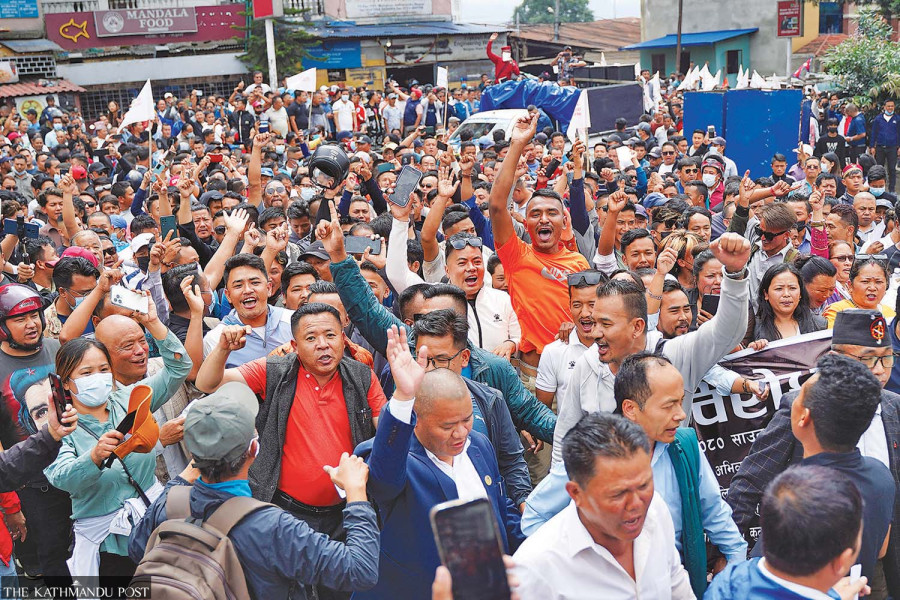National
Joint movement of indigenous nationalities essential to safeguard achievements, say activists
Recent struggle indicates that indigenous nationalities are dissatisfied and angry but they also have no collective way to channel their frustration. Activists say the movement against the ‘Koshi’ name could inspire more groups.
Tika R Pradhan
The Nepal Federation of Indigenous Nationalities (NEFIN) has announced the celebration of this year’s World Indigenous Day with a week-long series of programmes, starting with the main function on Wednesday.
Prime Minister Pushpa Kamal Dahal is scheduled to kick off the celebrations of the 29th International Day for World’s Indigenous People and address the main function to be held at Nepal Academy, Kathmandu. In the past, there used to be a grand celebration at Tundikhel, which is now divided into smaller spaces.
Nepal started celebrating the day in 1993.
For long, indigenous leaders have been expressing concerns over the weakening indigenous movement in Nepal. They accuse the state of gradually backtracking on the agreements signed with them and failing to abide by the constitutional and legal safeguards for the groups. A few recent events suggest their dissatisfaction has boiled over and they are now ready to revitalise the indigenous movement under the umbrella of NEFIN.
One of the major struggles is the ongoing movement against the naming of ‘Koshi’ province. Activists have been demanding the province be renamed to reflect its ethnic identity. The cause has seen widespread support and the ruling CPN (Maoist Centre) has also admitted to its mistake by voting in favour of the ‘Koshi’ name, which marked a departure from the party’s previous support for identity-based provincial names.
Professor Mahendra Lawoti, who recently visited eight districts of the province, said he saw an encouraging participation in the struggle against the province’s nomenclature, including from cadres of all the parties including the UML, the Nepali Congress, and the Maoist Centre.
“I believe that the movement will certainly expand to other provinces,” Lawoti told the Post. “I don’t think they will relent without changing the province’s name.”
Though many indigenous leaders believe the indigenous movement has lost its steam, Lawoti has a different take.
He says the indigenous movement has not weakened but that it has taken different forms, and the ongoing struggle in eastern Nepal is an example.
“The rise of the Tharu-led Nagarik Unmukti Party and the CK Raut-led party shows that the indigenous movement continues to thrive,” Lawoti, the author of several books on indigenous issues, said. “There were only two Madhesh-based parties initially and now there are more, which is a significant development.”
The movement of Dalits, he adds, was gaining momentum, too, even though they are not visible on the streets.
However, other indigenous leaders say the struggles of recent days like the one in Koshi were just reactive movements and no effort has as yet been made for a unified revolt.
Nepal’s indigenous nationalities are not focussed on proactive movements, said Malla K Sundar, a leader of indigenous nationalities. “NEFIN should have taken the lead for a joint movement of all the indigenous nationalities but the federation is ineffective.”
With the umbrella organisation of the indigenous nationalities beset by political meddling, there have been no joint movements of indigenous people. But some issues seem to have touched a raw nerve and prompted them to unite, most recently a statement by advocate Bhagwati Pandey.
Advocate Pandey said in a television interview that there is a practice of marriage between brothers and sisters in the Muslim, Magar and Tamang communities. Magar and Tamang communities took exception to her statement and have been protesting. Pandey later apologised, which the activists said was too little, too late.
Police had detained Pandey for the statement but she was later released after the Kathmandu District Court found no ground to keep her in custody.
“The ongoing struggle against Pandey’s statement is nothing but a message that indigenous groups are in no mood to tolerate any discrimination,” said Govinda Chhantyal, an indigenous activist and researcher. “They will now resist.”
Despite the country being declared a secular state, many indigenous people have been serving prison sentences for killing the cow, even though it is a part of their culture. Indigenous leaders have objected to the recognition accorded to the cow as Nepal’s national animal.
Nepal’s indigenous nationalities had secured many wins during the recent political movements: the secular state, the provision of proportional representation and reservation, among other things. But with the indigenous movement losing steam, all such achievements face the threat of being reversed.
“I think the World Indigenous Day is not an occasion to celebrate but an opportunity for the indigenous people to remind themselves of their struggle,” said Chhantyal, the former vice-chair of NEFIN. “In today’s context, NEFIN should have celebrated this year’s indigenous day in Province 1.”
One activist has died, dozens of others have been injured while some say they are battling “fake” police cases for daring to protest against the name ‘Koshi’.
Activist Niranti Tumbapo Limbu, general secretary of the Kirat Yakthum Chumlung, also said August 9 should be utilised to take the indigenous people’s struggle to the streets in various parts of the country.
Limbu, who is a key leader of the ‘No Koshi’ movement, said the indigenous groups will unite when they can no longer tolerate the state’s “suppression”.
“This is bound to happen sooner or later,” Limbu told the Post.




 8.22°C Kathmandu
8.22°C Kathmandu














